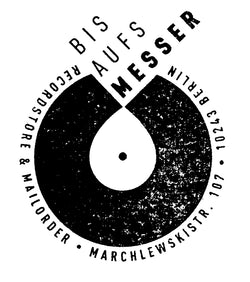“I hate all the words” by Luca Scarabelli and Michele Lombardelli’s Untitled Noise, the eight instalments in the celebrated Die Schachtel’s “Decay music” series, is a concept album composed of three tracks designed to explore the remote and hidden depths of psyche: Misery, the awareness; The Time, the suspension of disbelief; and Heaven, the existential atonement through detachment.
The sounds and the voice proceed alternately, overlapping, where each, in its progression, asserts itself autonomously—entities unto themselves, presences in dialogue at the edge of possibility. At times primitive and obsessive, they emerge as reminiscences of the unconscious and emotions, which coincide with unconscious, altered, and unexpected lowness. Sound and voice in unison are a burst of a great energy. Noise-glitch sound patterns, distortions, and objects set into vibration in the "soundscape" are mainly performed by Michele Lombardelli.
The lyrics, interpreted by Erica Bazzeghini, were written by Luca Scarabelli, drawing inspiration from a personal experience as well as his art. In Luca’s reflection, “I hate all the words” is a path to test the truth, the mistery and the meaning of words.
“Self-reflection has been an intimate journey, often conducted in the seclusion, away from the chaos of external reality. In the lyrics it is mirrored in three distinct stages: self-awareness marked by Misery, the suspension of disbelief symbolized by the passage of Time, a moment of misgiving, and finally, recovery through detachment, in the track Heaven. In my thoughts, I see the works of poets like T.S. Eliot, Georg Trakl, and Sylvia Plath, who explored personal pain and transformation.
In “I hate all the words” resonate the mysterious meaning of words as well as the poetry hidden in them. In Eliot's poem "The Waste Land," he writes: "This music crept by me upon the waters" quoting “The Tempest” by Shakespeare, encapsulating melancholy and a sense of being lulled over one's own ruins.
In Georg Trakl's poem "De Profundis," he captures this sense of apprehension through his vivid imagery: "Es ist die Seele ein Fremdes auf Erden. / An Abenden, wenn die Glocke im Dorfe / Langsam der Frieden uns kündet, / Folgt uns die schwarze Verwesung. ("The soul is a stranger on Earth. / In the evenings, when the bell in the village / Slowly announces peace to us, / The black decay follows us.").The exploration of time's fluidity creates a mental space to be explored, much like the soul existing as a stranger on earth.
In Sylvia Plath's poem "Mirror," she writes: "Faces and darkness separate us over and over." The mirror doesn't reflect the self, but the lament of words.
In “I hate all the words” all the “colours” have become dull. Fragments of thoughts and a sonic exploration change the perception of the present reality, evoking the ghosts of the past, in a shattered time, with the weight of whispered words.
Cookies
Wir verwenden Cookies. Viele sind notwendig, um die Website und ihre Funktionen zu betreiben, andere sind für statistische oder Marketingzwecke. Mit der Entscheidung "Nur essentielle Cookies akzeptieren" werden wir Ihre Privatsphäre respektieren und keine Cookies setzen, die nicht für den Betrieb der Seite notwendig sind.
Essenzielle
Statistik & Marketing
Alle akzeptieren
Nur Essentielle Cookies akzeptieren
Individuelle Cookie Einstellungen
Speichern & schließen
Essenzielle
Essenzielle Cookies ermöglichen grundlegende Funktionen und sind für die einwandfreie Funktion der Website erforderlich.
Informationen anzeigen
Statistik & Marketing
Marketing-Cookies werden von Drittanbietern oder Publishern verwendet, um personalisierte Werbung anzuzeigen. Sie tun dies, indem sie Besucher über Websites hinweg verfolgen.

